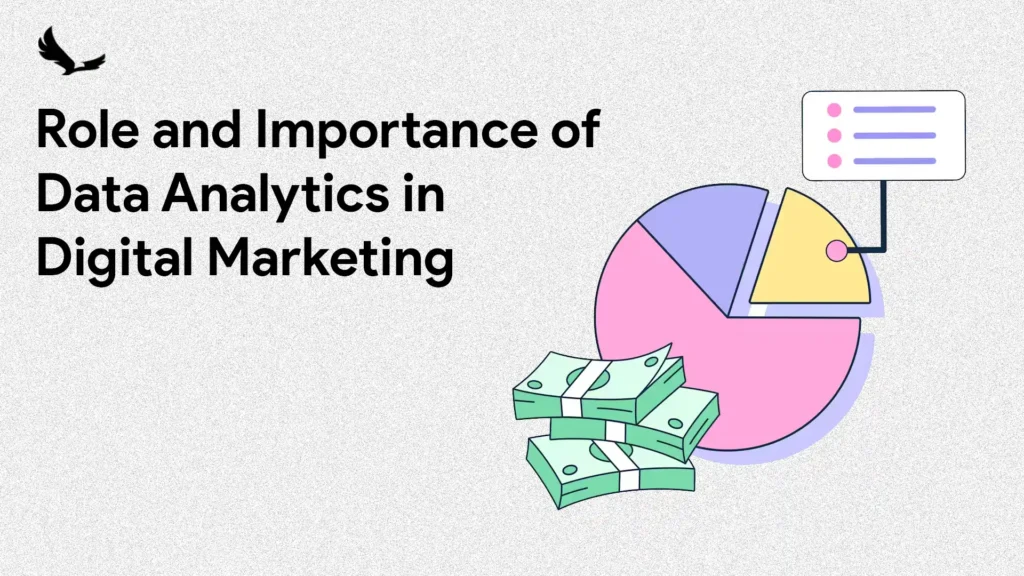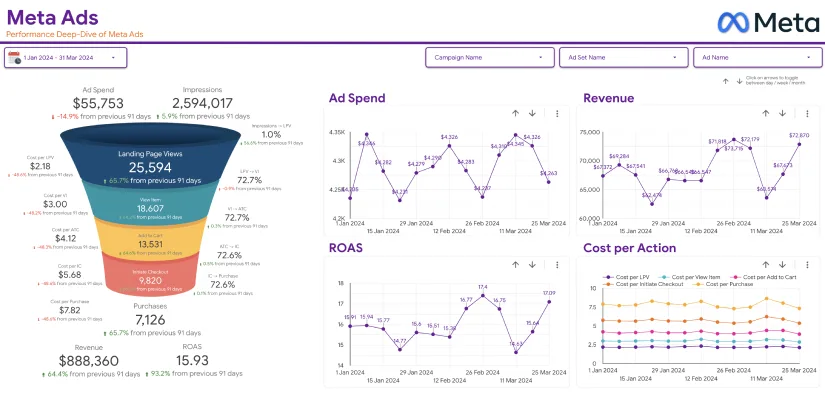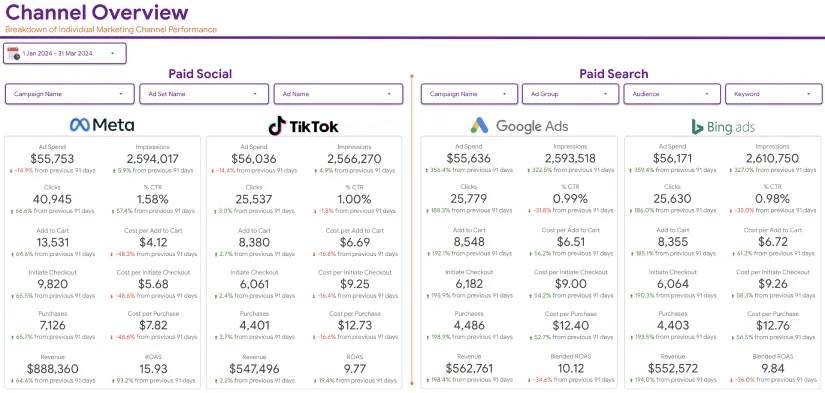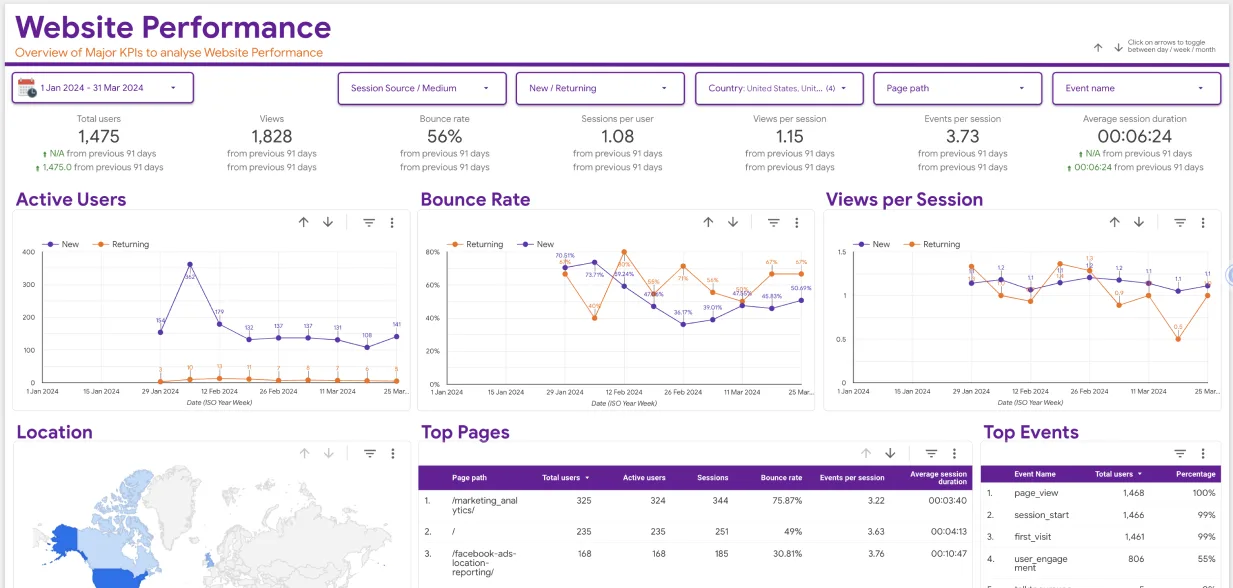In the world of marketing, data is king, and you’ve probably come across the terms data warehouse vs marketing database. These two terms tend to be used interchangeably, but as you’ll discover soon, they have some key differences worth mentioning.
Both data warehouse and marketing database are built to store and organize data. However, their structures, purposes, and ideal use cases are a bit different. Here, we’ll be looking at their main differences to help you make an informed decision on which one suits your business best. Spoiler alert: you might actually need them both!
But before we jump right into the differences, let’s look at what is data warehouse database marketing.
What Is a Data Warehouse?
A data warehouse is more like a central library where all your company data from different sources is stored. It’s an extensive storage hub built to consolidate data from multiple sources, whether it’s a sales system, CRM, or analytics. A typical database does the work of storing data, but a data warehouse is purposely built for analysis and reporting rather than retrieving stored data.
With a data warehouse, you can analyze data to discover insights and build business intelligence from the dashboards and reports. So, that’s to say a data warehouse stores a wide variety of data, from raw to highly cleansed, filtered data.
Some of the prominent data warehouses in the market include Amazon Redshift, Google BigQuery, Snowflake, and Microsoft’s Azure Synapse Analytics.
How Does a Data Warehouse Store Data from Disparate Sources?
You’re now probably wondering, “How can you store data from multiple separate sources? How do I deal with compatibility issues?” all these questions can be answered through the Extract, Transform, Load (ETL) process.
This is an advanced process of extracting data from different connected sources, transforming it into one through various operations and requirements, and then loading it into the data warehouse. The process works with a schedule to perform hourly or daily data transfer according to the ETL tool you use. Since transfer doesn’t happen continuously in real-time, your data warehouse may not be up to date at all times.

Data warehouses, like typical databases, usually have fixed and pre-defined relational schema. This is important for ensuring that operations with structured data occur smoothly. However, some warehouses can also work with semi-structured data.
What is a Marketing Database?
A marketing database has a more straightforward function. It’s designed to store one type of data to support marketing activity, such as customer information, and campaign data, among other crucial campaign metrics. In the data warehouse vs marketing database comparison, the former handles complex operations, while the latter performs lighter queries.
For instance, email lists, Google Analytics, and your CRM data housed in your marketing automation tool are some of the best examples of marketing databases. The objective of a marketing database is to assist marketers in effectively managing, segmenting, and communicating with their customers. That means it’s much leaner, faster, and action-oriented than the expansive data warehouse.
A marketing database would help you answer simple questions in your marketing, like “How many clients have been around for at least a year?” Data warehouses, on the other hand, perform much more complex analysis and reporting, so they have to be enormous.
But despite their gigantic sizes, data warehouses shouldn’t be confused with data marts or data lakes. Data lakes are bigger repositories of enterprise data housed in its raw format while data marts are data warehouse subsets dedicated to a particular business department.
When Do You Need a Marketing Database
Now that you understand what a marketing database is, when do you need one? Marketing databases are useful when you’re running a targeted campaign that focuses on customer engagement. They’re helpful when you need to drill down on specific segments to provide your clients with personalized experiences.
They also come in handy when you need to analyze your marketing campaign’s performance in real-time. Marketing databases are pretty quick in handling queries and provide up-to-date data for optimized marketing campaigns.
Data Warehouse vs Marketing Database: The Key Differences

In deciding which one best suits your business needs, let’s look at the data warehouse vs marketing database key differences:
Purpose
A marketing database is mainly used for managing and optimizing the marketing efforts of businesses. They’re great at processing online transactions, hence ideal for handling simple day-to-day queries such as retrieving account balance, reservations, or inventory status.
A data warehouse serves as a long-term storage solution for analysis and reporting purposes. They’re mainly used for online analytical processing (OLAP), allowing you to run highly complex queries using historical data from different sources of data. It allows marketers to identify long-term trends that are important to strategic decision-making. Think of a data warehouse as an archive built to support business intelligence and analytics.
Data Sources
A marketing database essentially stores customer data from one source only. It stores data such as email engagement, purchase history, social media interactions, and demographic data. As such, marketing databases are optimized to handle campaign performance and customer insights by drawing from marketing automation tools and CRM.
On the other hand, data warehouses are not limited in terms of the data sources. It can pull data from several sources that are sometimes disconnected. The data sources can range from marketing, HR, and finance, to sales systems. By sourcing data from multiple sources, marketers can get a comprehensive view of the whole business, making it ideal for analyzing highly complex trends.
User Base
A marketing database can support applications with thousands or even millions of concurrent users. That’s because it only handles simple data processing such as retrieving and storage. It’s built for marketers and is user-friendly, allowing them to create segments, tailor customer outreach, and analyze their campaign performance without technical skills.
On the other hand, data warehouses can only serve a handful of users at the same time since they handle much more complex queries. They’re built for data scientists, analysts, and C-level executives looking for a panoramic view of the business. Business intelligence tools source their data from data warehouses and, therefore, are crucial for high-level analysis and reporting.
Query Complexity

Marketing databases are built to process fast and focused queries. They’re ideal for segmentation and analysis. That’s why marketers find them useful in answering questions such as, “How many high-performing customers do we have in this region?” or “What percentage of our marketing emails were opened last month?”
Data warehouses are synonymous with complex queries. They’re built to handle multi-dimensional analysis so businesses can comprehensively understand data across various departments, periods, or other metrics. Despite running complex queries, data warehouses offer powerful insights but will need robust data management tools. They also require deeper technical knowledge to operate.
Data Warehouse Vs Marketing Database: Which One Should You Choose
No matter the type of application you’re using, you need a marketing database. Applications such as CRM, email marketing, and web analytics tools utilize a marketing database to make operations run smoothly.
But if you want to combine data from multiple sources and analyze them, your marketing database may need to be complemented with a data warehouse. So, which one should you choose in the data warehouse vs marketing database?
To help you answer this question, consider these important factors:
When To Choose a Data Warehouse
Due to the complex nature of a data warehouse, it’s only useful if:
- Your business depends on long-term data analysis and reporting.
- You need one reliable source of truth for all the data coming from various departments.
- You make your strategic decisions based on historical trends and big-picture analysis.
- You’re dealing with multi-dimensional queries that rely on data from multiple sources.
The sad truth about using data warehouses is that your business may not gain much from them if you don’t have team members who understand and can run SQL (Structured Query Language) commands. If you have someone on your team with the technical skills and are not afraid to get their hands dirty, a data warehouse might be just what you need.
When To Choose a Marketing Database

Go for a marketing database if:
- Your main focus is enhancing customer engagement and optimizing your marketing campaigns.
- You need a faster way to segment your customers and make adjustments to your campaign in real-time.
- Your marketing team runs a personalized outreach and needs quick access to customer data.
To efficiently use a marketing database, you won’t need the level of skills required for a data warehouse. However, your marketing team should have some idea about grouping customers according to their purchase history, behavior, or demographics.
Also, you should understand performance metrics like click-through rates and open rates. Familiarity with CRMs such as Mailchimp or HubSpot can also be helpful in effectively leveraging the marketing database.
Conclusion
In the highly competitive data-driven digital market, the adoption of data warehouses and marketing databases is increasing rapidly across different enterprises and marketing agencies. We estimate that in the next two to three years, more companies will begin to shift from marketing databases to data warehouses.
For now, the choice of data warehouse vs marketing database solely depends on what your business needs. If you want to analyze data from different departments of your organization to make strategic, long-term decisions, you must choose a data warehouse. However, if your focus is on enhancing customer segmentation and marketing agility, you’re better off going for a marketing database.
Most businesses today, especially those that want to scale, opt for combining both solutions to balance real-time execution with strategic insights. Whatever your needs are, you can efficiently deploy the right solution with help from professionals who understand marketing databases and data warehouses. Get in touch with Eaglytics Co. to find out how our data storage and analytics services can help your business.





